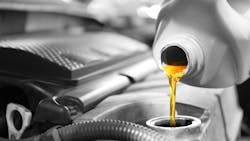How PC-12 provides material advantage for fleets
The American Petroleum Institute (API), in partnership with various industry stakeholders, has been developing Proposed Category 12 (PC-12), the new heavy-duty engine oil category, since 2021 for a planned rollout on January 1, 2027. These new lubricants will provide advanced efficiency, reliability, and oxidative and thermal resistance for your equipment — supporting the cutting-edge technologies that differentiate modern engines and enable fuel economy improvements.
While there will be challenges, they also present opportunities for advancement: The people who most effectively navigate the change will emerge as leaders in any industry that relies on heavy-duty diesel engines. Effective navigation will come down to two things: proper planning and choosing the right lubricant partner to help you properly take advantage of PC-12’s changes.
What’s different about PC-12
At its core, PC-12 is designed to provide better reliability and durability for your equipment through enhancements in oxidative and thermal resistance, wear performance, and compatibility with exhaust aftertreatment systems. PC-12 will also continue the journey that began in PC-11 (now API FA-4) to significantly improve fuel economy with the inclusion of viscosity grades that have never before been allowed within the API systems for use in diesel engines, with the allowance of xW-20 grades.
The actual fuel efficiency improvements will depend on the current viscosity grade in use and what future viscosity grade will be recommended for a specific engine model. The magnitude of these benefits will become more clear as the industry gets closer to the PC-12 launch. While you will see lower viscosity grades on some (but not all) of the fluids’ labels, you can still expect these oils to provide at least the same protection as the current categories for engines that allow those viscosity grades, since the primary, enhanced testing requirements for oxidation and durability are the same for all PC-12 lubricants.
The improvements in reliability and longer lifespan for your aftertreatment system components are natural consequences of the formulation changes needed to meet the stricter engine test limits and lowered SAP limits of the specification: oxidative and thermal resistance can be the result of improvements in the quality of base stocks and/or anti-oxidant additives utilized, and the better compatibility with the aftertreatment systems is achieved via reduction in ash and phosphorous containing additives which can have negative impacts on these systems. Though generations of mechanics have come to associate ash and phosphorous levels as indicators of a lubricant’s protective qualities, modern lubricant technology and oil analysis programs have left that in the past, and you can rest assured that PC-12 provides protection for your equipment that you can rely on.
Splitting into separate categories
As with PC-11, PC-12 will be separated into two categories: PC-12A, which is backward compatible with legacy equipment, and PC-12B, which is designed for greater efficiency potential in modern, advanced engine designs. Both provide the same level of durability but are designed for different machinery and different needs. PC-12A will ensure your high-mileage, trusted equipment will continue to work for you and potentially provide longer oil life in the process, while PC-12B will enable you to take advantage of the maximum efficiency potential for your operation — especially with engines that allow the new XW-20 viscosity grades.
Dividing the lubricants into categories allows industry leaders to better serve their fleet — both mixed and homogeneous — without over-complicating their oil inventory or compromising the performance of their equipment. There’s no reason to decommission perfectly serviceable older equipment or compromise the performance of brand-new top-tier engineering. When you stock your lube supply with PC-12 products and work closely with a trusted lubricant partner, you can be sure that you’re getting the best possible performance and efficiency from your fleet.
About Mobil Lubricants
As longstanding members of the API, Mobil Lubricants took an active role in helping develop PC-12, staffing our teams with experts experienced in both field work and the development of previous categories like PC-11 and even PC-10. These experts provided valuable insights into what challenges the transition would face, as well as identifying customer needs and pain points. They also worked closely with the OEMs — starting at the earliest inception of PC-12 — to ensure that the new engine designs and next-generation lubricants worked together harmoniously.
As a company built on proactively identifying and addressing industry challenges before they arise, we have ensured that we have the formulations and solutions for every step on this journey and can help you use the PC-12 transition as an opportunity to differentiate yourself in a competitive market.
About the Author
Rob Banas
Rob Banas serves as CVL OEM Advisor at ExxonMobil, products technology.

Steve Jetter
Steve Jetter is an OEM Technology Advisor at ExxonMobil. He has been with the company for 34 years and has worked in a variety of roles across fuels and lubricants.
